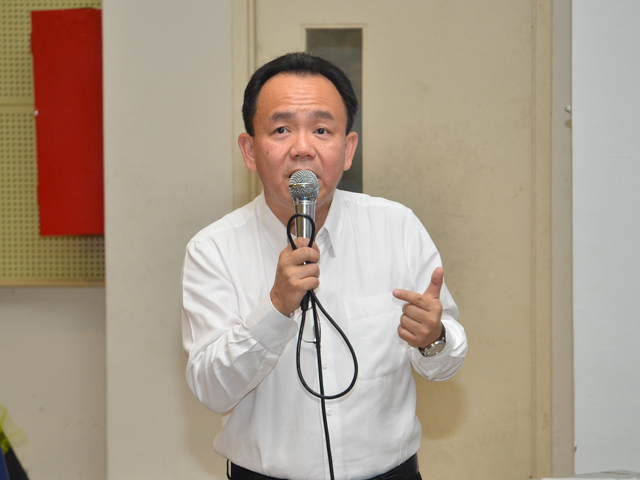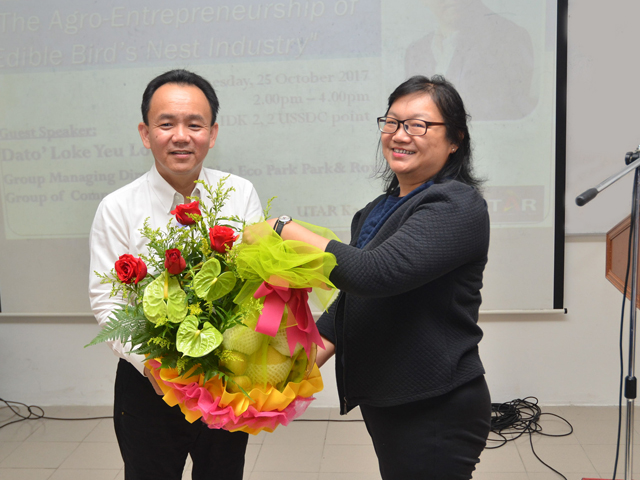
“Innovation is a non-stop process. As the market leader in the edible bird’s nest industry, one has to constantly pioneer new initiatives and break new grounds to overcome any crisis that comes along. The only way is to think forward and constantly innovate,” inspired Group Managing Director of Swiftlet Eco Park and Royal Bird’s Nest Group of Companies Dato’ Loke Yeu Loong at the recently held entrepreneurial talk that was jointly organised by UTAR Entrepreneurship Society, Faculty of Business and Finance (FBF) and Department of Consultancy and Commercialisation (DCC) at Kampar Campus on 25 October 2017.

Dato’ Loke inspiring the students by sharing his journey of success
Attended by more than 150 students, the talk titled “The Agro-Entrepreneurship of Edible Bird’s Nest Industry” was focused on Dato’ Loke’s valuable experiences and extensive knowledge of the edible bird’s nest industry, particularly in Malaysia. His two-hour talk was part of DCC’s entrepreneurial talk series and was aimed to enlighten students on business and the qualities of a successful entrepreneur.
Also attending the talk were UTAR FBF Dean Dr Au Yong Hui Nee, Head of Postgraduate Programmes of the Faculty of Medicine and Health Sciences-cum-Chairperson of Centre for Cancer Research Prof Dr Lim Yang Mooi, DCC’s Assistant Manager Esther Thien Pik Kim, UTAR staff and students.
Dato’ Loke is an entrepreneur who believed that challenges were merely opportunities in disguise. According to him, Swiftlet farming in Malaysia was started in the 1990s when Indonesia faced forest fires, which drove millions of swiftlets to migrate to Malaysia.
Dato’ Loke shared, “What appeared as a challenge to one country became an opportunity for another. With a global production of RM15billion worth of raw edible bird’s nest, and a major portion of it coming from Indonesia (60%), Malaysia (25%) and Thailand (10%), it is truly a golden opportunity. I have always had a keen interest in the bird’s nest industry, to the extent of even going to Indonesia to learn the most effective techniques in swiftlet farming.”
He added, “At that time, swiftlets were building their nests in towns and cities, which become a health threat and public frustration to residents. This challenge paved us the opportunity to come up with the fresh idea of developing an eco-park for swiftlet ranching away from these residential and commercial areas, which not only addresses the health hazard issue but is also a sustainable source of revenue.” The Group now has close to 100 eco-friendly swiftlet houses and an integrated procession plant to clean the raw edible bird’s nests.
Remarkably, the Group is the first and only industry player to have a complete upstream and downstream value chain, and responsible for overseeing the production of edible bird’s nest from farming to production to research and distribution. With that, Dato’ Loke said, “This has raised the barriers to entry so high that we have no equivalent competitors in the industry. To survive and thrive in business today, one has to constantly innovate and be a few steps ahead of the curve. Challenges can come from anywhere and no one is spared from them. To succeed, we must seek out the opportunity that lies beneath these challenges and capitalise on them.”
Viewing every crisis as an opportunity, he steered the Group to expand their version far beyond. The Group launched a few initiatives concurrently as the crisis required a multi-pronged approach. First, they started Research and Development (R&D) collaborations with local universities, research institutes and medical centres on the bird’s nest nutrition, beauty and medicinal values. He enthused, “Although the benefits of bird’s nest have been inscribed for centuries, not much scientific research has been done on it. We are the first and only industry player in Malaysia who embarked on this R&D effort as our new markets wanted scientific evidence of the benefits of bird’s nest, and not text gleaned from the Chinese ancient books. We now have scientific proof that bird’s nest is a rich source of amino acids and mineral salts.”
The extensive R&D efforts also led the Group to discover an optimal way to extract the essence of bird’s nests, which led to the development of other bird’s nest-related products, such as the functional food, health supplement, cosmetic, skin and beauty care, marketed under the Royal Bird’s Nest brand. These value-added products not only fetch a better margin compared to raw bird’s nest, but also open up new territorial markets for him.
He added, “To effectively market the Royal Bird’s Nest products, the Group has set up a network marketing company in 2013 which received a splendid response from the Malay market, a non-traditional market of edible bird’s nest. Many people are scepticalabout selling bird’s nest to this market segment but our value-added products have successfully paved the way and currently, 60% of our customers based are Malays.”
Last but not least, Dato’ Loke enthused, “In the next five years, the company envisions stepping up on its R&D efforts to transform the Edible Bird’s Nest from its traditional use as a food or supplement to be a powerhouse in medicinal drugs, especially in the area of diabetes, cancer, anti-aging, and a host of inflammatory and neurological diseases.”
UTAR and Royal Bird's Nest Sdn Bhd (RBN) signed a memorandum of understanding on 3 December 2012 to collaborate on research and development in the fields of medical, health and agricultural science and engineering, especially areas that are related to health supplement products such as edible bird's nest. UTAR officially received RM30,000 grant for research in edible bird's nest from its corporate partner RBN, the research arm of Swiftlet Eco Park Group of Companies, at a ceremony on 23 June 2013.

Dr Au Yong (right) presenting a token of appreciation to Dato’ Loke
© 2019 UNIVERSITI TUNKU ABDUL RAHMAN DU012(A).
Wholly owned by UTAR Education Foundation Co. No. 578227-M LEGAL STATEMENT TERM OF USAGE PRIVACY NOTICE